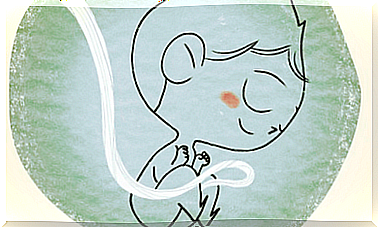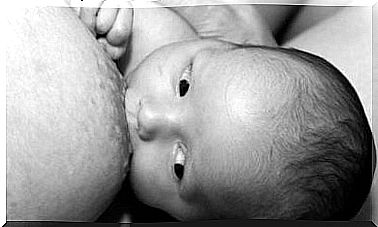First-Time Mothers: What You Need To Know When Your Baby Comes

It is a challenge for all first-time mothers to face a birth and have to take care of a newborn. It requires tremendous physical, mental and emotional effort. In this article, we share all the things that first-time mothers should know.
All first-time mothers have to deal with things that she did not know anything about in the past. Motherhood is one of the best experiences in a woman’s life. But when she gives birth for the first time, it is only natural that she has lots of fears and worries.
How should I raise my child? What is normal and what is a warning sign? These are questions that arise.
The strange color of the baby’s first stool and their frequent colic along with all the advice we’ve never asked for can all be overwhelming when motherhood arrives.
Therefore, in this article, we give you an overview of the realities that all first-time mothers face. Write down the things a first-time mom needs to know when the time comes.

What should first-time mothers know about breastfeeding?
A new mother needs to keep in mind that there is no better food for her baby than breast milk. Breast milk satisfies all their nutritional needs and it plays a role in their emotional and intellectual development. It also strengthens their immune system.
Breastfeeding not only has several benefits for your baby. It’s healthy for you too. It has been proven that breastfeeding can help the mother regain her figure after giving birth. It also reduces the risk of postpartum depression.
Another aspect you need to keep in mind as a first-time mother is that you need to maintain eye contact and communication with your babies during breastfeeding. In this way, you are able to establish a solid bond that only a mother can have with her child.
Remember that if you decide to breastfeed your baby, then your nipples may get irritated at first. You can cover your nipples with marigold cream before, and even during, breastfeeding to avoid this.
First diaper change: the challenge for first-time mothers
Do not panic if you notice that your baby’s first stool is dark. This is perfectly normal, although it can be scary for first-time mothers.
This dark stool is known as meconium. After a while, you will notice that their stools clear up.
Another thing that often stresses new mothers is the frequency of diaper changes. In general, it is recommended to change diapers 12 times a day. Of course, good hygiene is necessary every time a nappy is changed.
Rinse baby’s buttocks with warm water or using calcareous oil and cotton swab. Another method that new moms can choose is a wet towel. It is important to make sure that this method does not cause the baby’s delicate skin to show allergic reactions.
To avoid the famous diaper rash, you can refrain from giving your baby diapers on for a while so that the skin can be allowed to breathe. This prevents irritation.
You can use special creams if your child has eczema.
The cramps!
All first-time mothers have heard people talk about them, but she often thinks she will not be able to identify them herself.
Do not worry. They are very easy to notice. Your baby will cry constantly when they experience them. And they will not be reassured no matter what strategy you use.
This discomfort that the child feels is caused by air that they cannot get rid of. There are a number of forms of massage you can perform to relieve colic and help them get rid of air.
You can take your baby’s legs and gently make them go up and down as if they are cycling. You can also massage their stomach clockwise, or use the ant trail technique.
Bath time
As you know, you can not bathe your baby until the umbilical cord falls off. However, you can still wash them using sponges and products that are particularly suitable for washing your baby at this stage.
First, take care of their umbilical cord. You can clean it using a cotton ball dipped in alcohol. This causes it to dry and fall off faster.
You also need to keep an eye out if you can smell a bad odor, blood or pus around their navel. If this is the case, contact your pediatrician.
In terms of bathing time, it is recommended that you always do it at the same time of day, and preferably in the evening. This routine not only gives a sense of order and security; it also relaxes the baby so they can sleep better.
The water should be around 37 degrees and the room should be heated and enclosed to avoid drafts. Have a towel on hand so you can dry them quickly so they don’t freeze.
First-time mothers and the baby’s sleep rhythm
It is recommended that new mothers lay the baby on its side as this prevents suffocation. It also reduces the risk of cot death.
Another recommendation is that babies spend the first six months sleeping in their parents’ bedroom.
A common mistake that new mothers make is to avoid making noise when the baby is sleeping during the day. It is best to let babies fall asleep to the usual sounds of activity at home so they can get used to them.

The reality is that your child does not sleep so well in the beginning. But it is important for them to be able to distinguish between day and night, and associate darkness with sleep.
When they are one and a half months old, they will begin to relate their sleep patterns to the light-dark cycle. It will make them more available for night rest.
The baby’s crib should be slightly raised to avoid reflux. Experts recommend that mothers place pillows around the baby so that they feel pressed and protected. Reduced space gives them a feeling of constant coziness and cuddling.
Tears and screams
What? Did you think that all babies’ cries sound the same? Welcome to the world of motherhood.
You will begin to perceive different types of crying to suit different needs. Here are the four most common:
- Need for diaper change
- They are hungry or thirsty
- They are tired
- They feel too hot or too cold
If you have covered all their basic needs and the crying continues, it will definitely feel weird for you. Simply give them lots of kisses and caresses as this will make them feel loved.
Enjoy these moments!
First-time mother: start your own adventure
It is a challenge for all new mothers to face birth and life as a mother as it requires tremendous physical, mental and emotional effort.
It is normal to worry about your lack of experience as well as fatigue. So there is nothing wrong with asking for help.
No one is born with a built-in motherhood button, nor are there any magic recipes that help a new mother become the best mother in the world.
The path is created by traveling through it. Enjoy the view and have a good trip!









